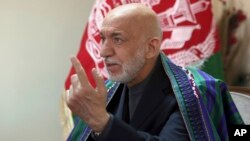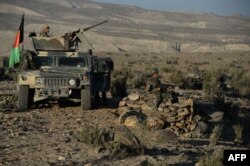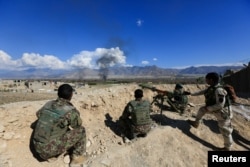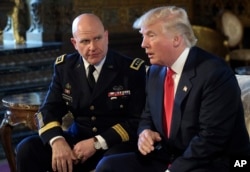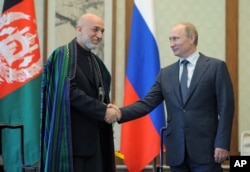Former Afghan President Hamid Karzai on Wednesday called the Islamic State terror group a "tool" of the United States, and dismissed criticism of Russia for its ties with Taliban and efforts to bring the militant group into peace talks.
"After it [the U.S.] dropped the bomb on Afghanistan, it did not eliminate Daesh," Karzai said, referring to last week's "mother of all bombs [MOAB]" attack against Islamic State.
"I consider Daesh their tool," Karzai told VOA's Afghan service in an exclusive interview in Kabul, using the Arabic acronym for IS. "I do not differentiate at all between Daesh and America."
The United States military, in partnership with Afghan forces, has promised to eliminate IS terrorists in Afghanistan this year and contain a resurgent Taliban, citing recent battlefield successes against the two groups.
IS-controlled territory
U.S. military spokesman Navy Captain Bill Salvin told VOA recently that counterterrorism operations, with Afghan forces in the lead, have reduced IS-controlled territory by "two-thirds" and the number of its fighters by "more than 50 percent."
Despite strong anti-IS efforts by the United States — especially in recent weeks — Karzai told VOA that the U.S.-led fight against IS has been "weak" over the past two years. He said there is plenty of evidence to back up his allegation, even though the U.S. has been fighting to wipe out IS and its allies in Syria, Iraq and elsewhere.
During most of his two terms in office, Karzai had close ties with the United States, whose invasion of Afghanistan to root out terrorist strongholds paved the way for his rise to power. He was welcomed at the White House and taken into confidence on U.S. military strategy in his country.
But his relationship with Washington has turned increasingly acrimonious in recent years. He sharply denounced the U.S. use of the bomb known as MOAB against IS underground headquarters in Afghanistan last week, adding that his successor, Ashraf Ghani, was a traitor for allowing the attack.
"They dropped an atomic bomb on Afghanistan — there's no difference between 'the mother of all bombs' and an atomic bomb," Karzai said.
IS has made inroads in Afghanistan in recent years and has claimed responsibility for deadly attacks, including last month's assault on a military hospital in Kabul that killed more than 30 people and injured 80 others.
Meanwhile, Taliban has been contesting government forces in key provinces nationwide.
Russia connections
Taliban connections with Russia have increasingly come under the spotlight as Moscow seeks to increase its influence in the nation it once occupied and to counter Islamic State expansion from Afghanistan to neighboring Central Asian countries.
Mounting allegations of Russian military involvement on the ground in Afghanistan have drawn concern from U.S. and Afghan authorities that Russia is working behind the scenes to help the Taliban battle Afghan forces and militant groups in the country, such as IS.
In his interview with VOA, Karzai dismissed criticism of Moscow's ties with the Taliban. Karzai has become closer to Russia since leaving office, saying during a visit to Moscow in 2015 to meet with President Vladimir Putin that he supported the annexation of Crimea.
"They talk to the Taliban," Karzai said of Russia. "The U.S. also talks to the Taliban. Norway, Germany and other countries also talk to them. Russia also has the right to hold talks with the Taliban."
News reports last October said at least one U.S. official participated in three rounds of "informal meetings" between the Afghan government and Taliban.
U.S. State Department spokesman Mark Toner would not comment on the reports at the time, but said the U.S. was "committed to promoting a negotiated settlement to end the Afghan conflict."
Avoid bolstering Taliban legitimacy
But U.S. National Security Adviser H.R. McMaster, who held talks with Afghan leaders in Kabul last weekend, said nations should avoid bolstering Taliban legitimacy.
"No one should support the Taliban," McMaster said, when asked to comment on Russia's overt contacts with the group. "No one should support armed resistance against the Afghan government and the Afghan people."
Still, Karzai told VOA: "The Taliban is a major reality in today's Afghanistan. The Americans themselves say that they [Taliban] control 50 percent of the Afghan territory. When a force controls 50 percent, countries have no option but to talk to them. The U.S. itself talks to them — they meet them in their office in Qatar."
U.S. and Afghan accounting of Taliban territory holdings do not support Karzai's claim.
The Afghan government said it currently controls nearly two-thirds of the country's 407 districts. The Taliban controls 33 districts, less than 10 percent of the national total, and a recent U.S. military assessment lists 116 districts — more than one-quarter of the country — as "contested" areas.
Russia has acknowledged political ties with Taliban. But Russian officials said Moscow is not supplying Taliban militants with arms and training, and that their contacts are only aimed at facilitating the peace process in Afghanistan.
"We do not provide any financial or military assistance to the Taliban. The allegations [of Russian assistance] are just a rumor and baseless," Russian Ambassador to Afghanistan Alexander Mantytskiy told reporters Wednesday in Kabul.
'Regional approach'
Moscow last week hosted a new expanded round of multination "consultations" it has recently launched with the stated goals of developing a "regional approach" for promoting Afghan security and a government-led national reconciliation with the Taliban.
But the U.S. administration refused to take part in the conference, questioning Russian intentions and motives. Washington was not invited to the previous round of talks.
"The main question on the agenda was the coordination of regional efforts aimed on supporting the process of national reconciliation in Afghanistan in the interest of the speedy restoration of peace in the country," Mantytskiy said. "The participants expressed shared concern regarding the rise of the terrorist activities in Afghanistan leading to the further escalation of the conflict."
Karzai told VOA that the U.S. is not sincere in bringing peace in the country.
"A conference was recently convened in Moscow. Why didn't America participate in it?" Karzai asked. "Why did it ask the Afghan government to send a low-level delegation to the conference?"
Karzai said that since 2008, he repeatedly relayed his displeasure with Americans to Putin who, he said, remained skeptical until 2012-13.
"But when I complained again during a gathering in Kyrgyzstan, Putin told me that there might be an element of truth in it," Karzai said.
